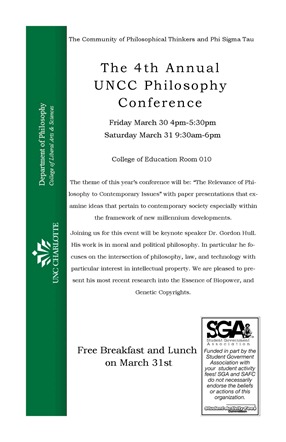A few days ago it occurred to me that I have no logical reason to take summer courses. I am not rushing toward graduating, there are no courses of special interest to me and really no compelling reason to seek out courses to take this summer.
So, with the logic of the decision to not seek out summer classes, this brings me to a interesting question: What the fuck am I going to do from May until August?
I’m not sure if anyone has noticed, but lately my blog has moved more and more toward focusing on my academic work, less on hobbies and less on me doing anything resembling having a life. The problem is, I have been in full on academic mindset since last January when I started my last semester of my undergraduate career. From there I was focused on graduating, then I was focused on getting a solid start on graduate school. Now I am faced with the prospect of 3 months with no formal plans.
Because I am a graduate student I cannot fully escape academics, its just not allowed, so I will likely spend some time working on some ideas for a thesis, or something along those lines, but that is not something to be used as the foundation of summer plans. I suppose the problem comes about from the fact that this is the first summer since 2006 that I haven’t taken summer classes and as such I have fallen out of practice with not having academics as a summer activity. That being said, my current feelings on the topic (with the outside temp being about 40 degrees currently), are that I’m looking forward to going back to the free and loose feeling that I enjoyed during the summer breaks in high school. I can’t say that I ever did much with them, but the time to relax and do nothing was always quite enjoyable.
The odd thing about this occurrence is that I suspect it will become normal for me to have breaks during the summer while in graduate school, except when I am working toward completing my thesis or dissertations. Change is a good thing in this case, but the adaptation to that change is going to be difficult, especially if I am going to make productive use of my time.
Some of the ideas I have had for this summer are to spend some time focusing on ceramics, maintaining a garden and perhaps spend a good amount of time swimming or some other traditionally summer outdoor activity.
My past summers:
2004: Art Appreciation, General Anthropology, Sociology of the Family
2005: JAVA Programming
2006: {Academic Break}
2007: Creative Writing I
2008: Digital Photography, Personal Health and Wellness
2009: Introduction to Biopsychology, Statistics for Psychology
2010: Behavior Modification
2011: Advanced Composition, Sociology of Gender, Greek History and Culture
 released. This will be my first presentation at an academic conference. It is somewhat exciting to see my name and my paper title appear in the schedule for the event. I am also very nervous and unsure of myself. It helps that I know that I will be presenting in front of faculty and students that I am at least somewhat familiar with. I have been wrestling with myself over how to make the topic of my paper to an audience of philosophers, and I’m still not convinced that I have come up with the right answer, but they did select me, so there must be something relevant to them.
released. This will be my first presentation at an academic conference. It is somewhat exciting to see my name and my paper title appear in the schedule for the event. I am also very nervous and unsure of myself. It helps that I know that I will be presenting in front of faculty and students that I am at least somewhat familiar with. I have been wrestling with myself over how to make the topic of my paper to an audience of philosophers, and I’m still not convinced that I have come up with the right answer, but they did select me, so there must be something relevant to them. 


